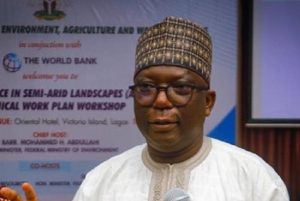The National Council on Climate Change (NCCC) in Nigeria says it has conducted a preliminary analysis for an appropriate governance framework and processes for the proper implementation of cooperation mechanisms under Article 6.

Article 6 of the Paris Agreement recognises that some Parties choose to pursue voluntary cooperation in the implementation of their Nationally Determined Contributions (NDCs) to allow for higher ambition in their mitigation and adaptation actions and to promote sustainable development and environmental integrity.
NCCC Director General & Secretary, Dr Salisu Dahiru, disclosed in a statement made available to EnviroNews on Saturday, June 24, 2023, that the Council would leverage its network of institutional partners like Ministries, Departments and Agencies (MDAs), Central Bank of Nigeria, Ministry of Petroleum Resources, United Nations Framework Convention on Climate Change (UNFCCC), United Nations Development Programme (UNDP), World Bank etc and the private sector, to prioritise carbon market access through the cooperative approach as outlined in the Paris Agreement.
His words: “The NCCC wishes to highlight the importance of domestic private sector operators to the success and attractiveness of Nigeria’s carbon market and seeks to encourage their participation by ramping up the decarbonisation of their respective value chains. For obvious reasons, the NCCC will be paying close attention to industry-specific methane abatement efforts under its mandate.”
The NCCC, he added, notes the fluidity in the current structure of voluntary carbon markets and the evolving integrity initiatives around it, pointing out that, to this end, the nation’s participation in the voluntary market would be based on government policies and development priorities, bringing credibility and predictability to encourage and protect participants.
“Therefore, a ‘No-Objection’ by the NCCC will be required by regulation to approve the issuance and transfer of certified credits generated across all sectors, in line with article 6.2 of the Paris Agreement,” he pointed out, adding that the NCCC would provide periodic updates and briefings on all carbon market related activities and reciprocally welcome stakeholders’ inputs, comments, and suggestions.
The Council reiterates the Nigerian government’s commitment to the global efforts to reduce emissions that contribute to climate change. In 2021, Nigeria announced its NetZero commitment at COP26 in Glasgow. This was followed by the passing of the Climate Change Act of 2021, and the subsequent establishment of the NCCC.
The Act applies to all Ministries, Departments and Agencies and to public and private entities within the territorial boundaries of Nigeria for the development and implementation of mechanisms geared towards fostering low carbon emission, environmentally sustainable and climate resilient economy.
Under the Climate Change Act, Nigeria intends to meet its commitments to and within the ambits of international treaties that address climate change, specifically, the Paris Agreement. In this regard, Nigeria’s engagement with carbon markets is linked to its development priorities, its NDCs and attainment of NetZero target.
Dahiru stated: “The Government of Nigeria recognises that mitigation outcomes alone are insufficient to achieve its climate targets, a position supported by global climate experts in the shared aspiration to limit atmospheric temperatures to 1.5oC. This is essential to avoiding or reducing extreme weather events and their devastating economic and social impacts.
“The World Bank’s ‘GRADE’ assessment of Nigeria’s 2022 flooding incident estimates the total direct economic damage to be about $7 billion. This is equivalent to 1.6% of Nigeria’s estimated 2021 GDP, not including loss of lives. It is on this premise that Nigeria’s evolving carbon markets approach must necessarily target investments to improve the climate disaster risk reduction and adaptive capacities of our communities and institutions while expanding opportunities in agriculture, forestry, water conservation and land-based interventions.”
